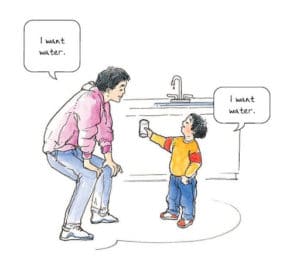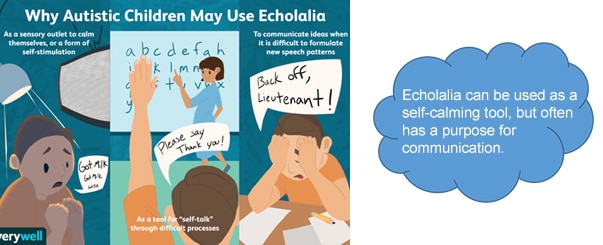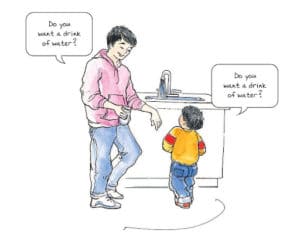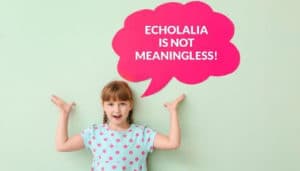- Echolalia is when children copy or repeat words that someone else has said. These may be from people who talk directly to them, TV ads or movies they watch, or other utterances that they hear during the day.
- There is no main cause of echolalia other than it being an alternative way of developing language.
There are two types of echolalia:
Immediate – when children repeat words as soon as they hear them
Delayed – when children repeat words after a period of time
It can be difficult to figure out what your child might be trying to say, but this form of communication supports their understanding and development of language.
 Children may repeat words to:
Children may repeat words to:
- Ask for things (e.g. a child might say “Do you want water?” to ask for water, as he has been previously offered water like this)
- Start or maintain an interaction (e.g. a child may want to start a game when he says “Ready 3,2,1… Go!”)
- To draw attention to something (e.g. a child might say “lights camera action” to draw attention to something he’s noticed)
- To protest something (e.g. a child might say “You don’t want to go home” when he is told to get ready to go home, he could mean “I don’t want to go home”)
- To answer yes (e.g. if a child imitates “Do you want a bath?” straight after the question, he may want to have a bath and is responding “yes”)
What to do when your child is echoing

You can then develop this into a response which helps your child to understand that his sentence is not quite right. – e.g. if he says “do you want water?” when asking for some water, you can say “No, I don’t want some water but you do. Say ‘I want some water’”.
Asking questions when your child echoes responses
It can be tricky if your child uses echolalia when they answer a question. However, this is one of the most frequent times that echolalia will occur, as a child may not know the right way to answer a question.
By saying the answer immediately after the question, you are identifying the key word for your child to hear and then imitate.
To help teach your child to answer questions:
- Ask only one type of question (“do you need the toilet?” or “what are you doing?”)
- Ask the question then provide a one-word answer straight away – e.g. “Do you need the toilet? Yes”. This shows your child how to answer and also provides an appropriate word to be repeating.
- As your child learns to answer your question, you can start reducing your own production of the answer. – e.g. just saying the first sound of the answer “Do you need the toilet? Yyy“. As you do this, encourage your child to respond with the goal that they will produce the answer without your prompting.
As echolalia can be difficult to interpret, think about the context and when your child may have heard the utterance, to gain a better idea of what they might be telling you. It may be hard to figure out the true meaning behind what your child is saying, but by understanding how it supports language and communication development can better prepare you for helping your child grow!
Written By:
Lacie Glen Vile
Speech Language Therapist



 Children may repeat words to:
Children may repeat words to:





